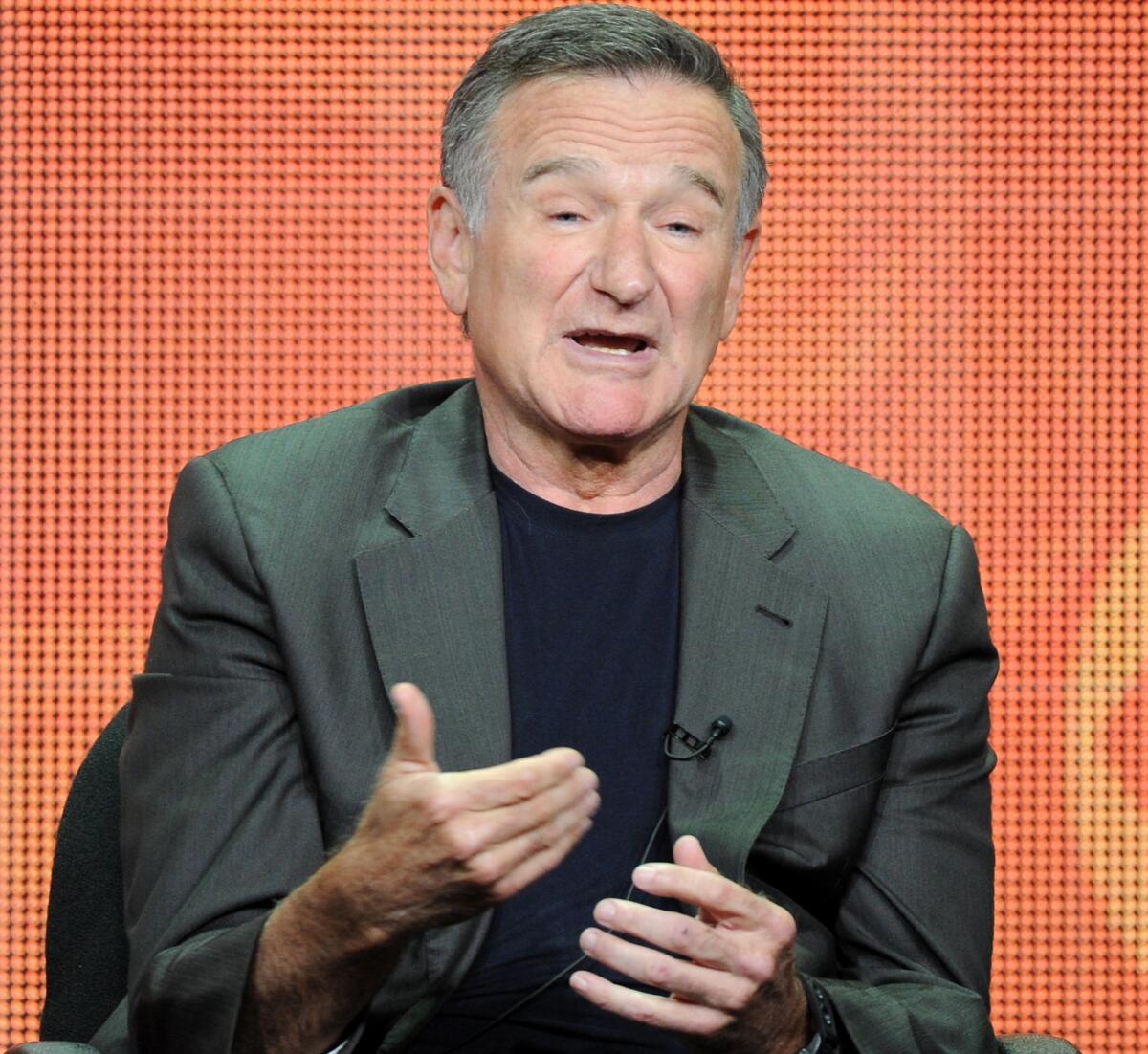Critic’s Notebook: Robin Williams ran a comedy marathon at a sprint

Robin Williams was impossible to confuse with any other comedian.
He cited Peter Sellers and “The Goon Show” among his inspirations, but among American comedians, his only obvious forebear (and eventual “Mork and Mindy” costar) was Jonathan Winters, who made an art of improvisation. Williams had that same quick brain and trust in the moment; what was new, and very much of his time, was the speed and the sweat.
It was a comedic adrenaline rush that, with a mind less well-organized, with resources less deep, would have produced gibberish. But just as there are people in the world who can jump really high or play the violin amazingly well, there are people whose brains work more quickly than most, who can jump from word to word and concept to tangential concept, improvising variations on a theme with spooky ease.
His work was fantastically allusive. Williams carried volumes in his head: lines from songs and plays and books and movies. Juilliard-trained, he would often affect a kind of stentorian thespian elegance, planting his feet apart and solidly on a stage, then shift into something out of Mel Blanc, then perhaps relax into what seemed to be his own, gentler voice.
Although one can divine classic structures and gambits in his work, the dizzying pace of Williams’ quick changes kept you continually off balance; you were always a step behind him. Planned, unplanned, it all seemed to come off the top of his head.
In 2002, to British interviewer Michael Parkinson, he described the process: “There is that thing of where you’ll go off on things — sometimes you’ll see a moment, and … you’ll just pursue it, and it’s a little bit like possession.”
Sequential, Parkinson suggests.
“Sequential, or it’s actually more like a fractal, and we’re getting even Stephen Hawking going [in synthesized Stephen Hawking voice], ‘Don’t go there now.’ I called his house one day, ‘Hello, this is Stephen Hawking,’ ‘I’d like to leave a message,’ ‘No, this is Stephen Hawking.’” Then, returning to the question, Williams said, “It’s that idea, ‘If A, then 2.’ You jump-start and go to different places, usually through some weird synapse firing.”
A typical sequence: In a performance taped in 1978 at the Roxy Theatre in West Hollywood, in the first, celebrity-attended flush of his fame, he heads up a stairway toward the balcony, doing a little Fred Astaire along the way, climbs onto the railing, shouts, “Sanctuary!” (from “The Hunchback of Notre Dame”), regards the PA speaker and says, “Quick impression: RCA Victor,” referring to the old His Master’s Voice logo, turns toward the balcony and says, “Look at this -- ‘Nice booth, Mr. Lincoln,’” says, “Now I will attempt for you,” but lets that go and looks out into the crowd and says, “One black person -- everybody look.”
In this and other stand-up specials he made over the years, Williams runs a marathon at a sprint. But perhaps his best work was as a guest on the many talk shows to which a busy career in the movies regularly brought him. The mix of formality and invention the format afforded was perfect for him; it gave him something to kick against, a seat to leap up from, and an interviewer to bounce off of, with any number of possibilities and places to go. Some of his last and best appearances were on CBS’ “Late Late Show,” alongside Craig Ferguson, who, like Williams, struggled with addiction, and (to drag T.S. Eliot into this) trusted, as a performer, in “the awful daring of a moment’s surrender which an age of prudence can never retract.”
Sitting down next to Johnny Carson on his astonishingly belated first “Tonight Show” appearance in 1981 – “Mork & Mindy” was in its fourth and last season, and his film career was about to take off with “The World According to Garp” -- Williams starts with what sounds like a written joke: “I suffer from severe dyslexia. I was the only child on my block to go Trick or Trout.”
Then he notices the boom microphone, dangling above him, and rises to meet it: “Look at these thing [sic, in a kind of Latin accent], look, Flipper.” He makes a dolphin noise, then barks and jumps at the mike like a dog, then says, lifting his hair into an attitude of surprise, “Right now, there’s a sound man going, ‘What are you doing?’’” Then to himself: “Oh, God, relax, relax, relax.” Then to Carson. “You’re a nice man; you won’t hurt me.” Then, drinking from Carson’s coffee mug, “Don’t be afraid. The sores went away.”
He was a kind of human cartoon -- a very human cartoon, full of contradictions that made him at once more lovable and more worrisome. (To do some bad math, he was half adorable scamp, half angry man, half learned professor, half sad clown.) It doesn’t seem accidental that in his first sitcom he played an alien and that his second and last, a 2013 return to series TV after decades spent mostly in film, was called “The Crazy Ones.”
Follow Robert Lloyd on Twitter @LATimesTVLloyd
More to Read
The complete guide to home viewing
Get Screen Gab for everything about the TV shows and streaming movies everyone’s talking about.
You may occasionally receive promotional content from the Los Angeles Times.







